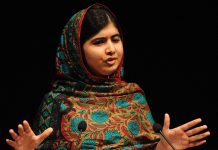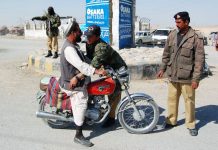Bannu: Depending on who you are, the issue of recent migration of a million internally displaced people from North Waziristan in the wake of Military Operation Zarb-e-Azb, can be a boon or a bane among the displaced people living here in Bannu.
To Abdullah Khan, it came as a surprise when he found Samina, his 8 years old niece, fluently speaking in the Marwat accent to her friends. Khan and his family had been living in Bannu since they were displaced from North Waziristan in June last year.
“In less than a year time, all children of my family have not adopted local accents but also many other practices from the Marwat society that are completely alien to our society in North Waziristan,” said Khan.
Samina, of course, is not the only child that has adopted the local “outlook” on life and things. Many parents among the more than a million IDPs from the North and an equal number of displaced from South Waziristan have expressed concern over the change in their children. What kind of culture they are going to adopt and take back to the tribal areas is a question frequently voiced by parents and sociologists these days.
There are those who take a positive perspective of it while others see nothing good ever coming out of migration, much less the threat it poses to local culture and traditions. This second school of thought bring an attitude that is scornful of anything that departs from their own culture because they feel tribal areas were the only place in the country where people could glimpse the old customs and traditions.
Culture is an abstract term, used in various senses by different writers and scholars. And like any abstract notion, different scholars have defined it in their own way, says Sharifullah Khan, a district management’s official from NWA and a former student of sociology. A definition of culture that is widely accepted explains it as a range of activities and ideas of a group of people with shared traditions – transmitted and reinforced by the members of the group or society. Some also call it a “particular civilization at a particular period of time.”
There is perhaps no nation in the world that doesn’t have a culture, says Khan, but the degree of intensity varies when it comes to cultural change.
The tribal society in the north west of Pakistan has traditionally held strong belief in its cultural integrity. The Pakhtun people here are strict in abidance of their cultural values – Pakhtunwali – than anyone else in the religion.
“But change in inevitable, never mind whether a group or a society is ready to accept it or not,” says Khan.
The tribal societies especially the people of Waziristan are among those who bristle at the talk of cultural change. Back in the day, when tractor was introduced for the first time in NWA Agency, the farmers were reluctant to plough their fields with it.
“My grandfather used to say the footprints of oxen have a ‘blessing’ not there in the tyres of a tractor,” said Haji Akbar, a tractor driver from North Waziristan. With the passage of time, the progeny of the same grandfather use tractor, wheat thrasher and other machinery for farming.
Same was the case with electricity. When the government for the first time installed electric poles and high tension wires to provide power, the local people resisted it saying it would make them lazy. But that too was accepted gradually and now those who once opposed electricity to the extent that they wouldn’t touch a switch, protest the long hours of load-shedding or power outages to make up for the shortfall for commercial activities.
All these things were opposed because it could bring a change in the existing tribal culture. “But the change took place and now the traditional society of the tribal people has been transformed into a relatively educated and modern one though not like the big cities of the country,” said Khan.
Tribal areas have a centuries old code of culture and have a set of traditions they have been following for hundreds of years. They say they have been living peacefully for so many years without any government or rulers only because of their strict abidance to traditions and culture.
They strictly follow the rule of an eye for an eye and an ear for an ear.
“But things got disturbed very rapidly after the Russian invasion in Afghanistan and then the 9/11 incident brought an abrupt change in the tribal society,” says Khan. “No one could even think at the time how fatal it was for the tribal people,” said the sociologist.
The Russian invasion in Afghanistan was fatal in the sense that it introduced the Kalashnikov culture among the fierce tribesmen and then came the drug culture – heroin – that destroyed a generation of young tribesmen.
But the biggest change in the lives of these tribesmen came when Pakistani security forces started operations in different areas of the tribal areas that forced them to leave their villages and lands and seek refuge in areas that have a different cultural set up than theirs.
“Actually I see it as a positive change that will bring many things in their lives,” said Saifullah Cheema, a sociologist based at Lahore.“They will learn how to adopt new and rapid changes in the world that they were unable to see without migrating to the settled areas. Migration will bring a passion for progress and competition in the tribesmen.”
Cheema said that women who were not even allowed to go out of their homes would now start taking part in the different activities.
Some social scholars are of the opinion that after the displaced people go back to their homes, there might be a clash of ideas among the old and the new generations — a generation gap that would threaten the existing remnants of the centuries old culture.
Maleeha Sayed, a Lahore based writer and sociologist said she saw that as a negative.
“Nothing is going right regarding the destruction of the valuable tribal culture,” said Maleeha. “When the youth goes back, do you think it will be without the attitudes and influence of a life they have experienced in cities like Peshawar and Islamabad?”
She was also concerned about the “clash of ideas” that would threaten peace and harmony in the tribal areas once the displaced return to their homes and hearth.
“The youth will take new values from here but the old people with traditional outlook would not countenance new attitudes,creating a state of chaos in the peaceful society of the tribal people,” said Maleeha.
Maleeha and other experts of social sciences fear that the clash between the attitudes of the young and old of the tribal society- given the fierce nature of the tribesmen, their reluctance to embrace social change and love for old culture, traditions and customs- would sow the seeds of discord among them.
They think that the clash would ruin the society and might ruin the tradition of respect and obedience for the elders in that society.
But others seem optimistic, terming the change in the social outlook of tribesmen as a sign of progress, education, sense of competition and eagerness for development.
“I think we will learn how to walk alongside a rapidly changing world after we go back,” said Tariq Khan, a migrant from NWA.



